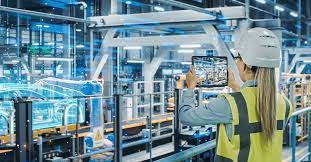The Future of Manufacturing: Innovation and Automation
In today’s rapidly evolving technological landscape, the manufacturing industry stands at the forefront of innovation and automation. With advancements in robotics, artificial intelligence, and data analytics, the future of manufacturing is being reshaped in ways previously unimaginable.
One of the key drivers of this transformation is the integration of smart technologies into traditional manufacturing processes. Smart factories equipped with sensors, connected devices, and real-time data analysis are revolutionizing production lines, improving efficiency, reducing downtime, and enhancing product quality.
Automation plays a pivotal role in modern manufacturing, streamlining operations and increasing productivity. Robots are increasingly being used for tasks that are repetitive, dangerous, or require high precision. This shift towards automation not only boosts efficiency but also creates safer working environments for employees.
Furthermore, additive manufacturing, commonly known as 3D printing, has opened up new possibilities in product design and prototyping. This technology allows manufacturers to create complex geometries with minimal material waste, leading to cost savings and faster time-to-market for new products.
Another significant trend in manufacturing is the rise of sustainable practices. Companies are increasingly adopting eco-friendly processes and materials to reduce their environmental impact. From energy-efficient production methods to recycling initiatives, sustainability has become a key focus for manufacturers looking to align with global environmental goals.
As we look ahead to the future of manufacturing, it is clear that innovation and automation will continue to drive industry growth and competitiveness. By embracing cutting-edge technologies and sustainable practices, manufacturers can stay ahead of the curve and meet the evolving demands of consumers in a rapidly changing world.
5 Essential Tips for Enhancing Manufacturing Efficiency and Quality
- Ensure efficient production processes to minimize waste and maximize output.
- Implement quality control measures to maintain high product standards.
- Regularly update equipment and technology to improve efficiency and stay competitive.
- Train employees on best practices for safety, productivity, and quality assurance.
- Maintain good communication among different departments to streamline operations and address issues promptly.
Ensure efficient production processes to minimize waste and maximize output.
To optimize manufacturing operations, it is crucial to prioritize efficiency in production processes to reduce waste and enhance output. By streamlining workflows, implementing lean manufacturing principles, and leveraging automation where applicable, manufacturers can minimize inefficiencies, improve resource utilization, and ultimately boost productivity. This proactive approach not only leads to cost savings but also contributes to a more sustainable and competitive manufacturing ecosystem.
Implement quality control measures to maintain high product standards.
Implementing quality control measures is essential in manufacturing to uphold high product standards. By establishing rigorous inspection processes, conducting thorough testing, and adhering to strict quality assurance protocols, manufacturers can ensure that every product that leaves their facility meets the highest standards of excellence. Quality control not only enhances customer satisfaction but also builds trust in the brand and fosters a reputation for reliability and consistency in the marketplace.
Regularly update equipment and technology to improve efficiency and stay competitive.
To maintain a competitive edge in the manufacturing industry, it is crucial to regularly update equipment and technology. By investing in the latest tools and machinery, manufacturers can enhance efficiency, streamline processes, and meet the growing demands of the market. Staying up-to-date with technological advancements not only improves productivity but also ensures that companies remain competitive in an ever-evolving landscape.
Train employees on best practices for safety, productivity, and quality assurance.
Training employees on best practices for safety, productivity, and quality assurance is essential in the manufacturing industry. By providing comprehensive training programs, companies can ensure that their workforce is equipped with the knowledge and skills needed to perform their tasks efficiently and safely. This investment in training not only enhances employee performance but also contributes to a culture of continuous improvement, leading to higher productivity levels and improved product quality.
Maintain good communication among different departments to streamline operations and address issues promptly.
Effective communication among various departments is crucial in the manufacturing industry to ensure streamlined operations and prompt issue resolution. By maintaining open lines of communication, teams can coordinate more efficiently, share vital information, and address challenges in a timely manner. This proactive approach not only enhances productivity but also fosters a collaborative work environment where solutions can be swiftly implemented to optimize processes and achieve operational excellence.

No Responses